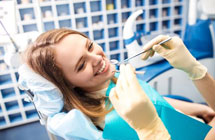打了这个疫苗,以后就不长龋齿了?
|
Dreaded trips to see your dentist could be replaced with a vaccine to prevent tooth decay in the future, researchers predict. The jab, developed by Chinese scientists, offers a dose of proteins that are effective at removing build-ups of plaque responsible for cavities. Early trials show it to be 64 percent effective - meaning people would still have to brush their teeth twice a day to avoid a trip to the dentist's chair. It offers hope of a 'fantastic' answer for preventing or even reversing cavities, which strike a third of adults, according to figures.
The researchers said the vaccine would be welcomed in Western countries, where teeth-rotting sugar is consumed heavily. But the team at the Wuhan Institute of Virology said the jab is several years away from undergoing clinical tests. However, experts are excited. 专家这样说 Dr Richard Marques, a Harley Street dentist, told MailOnline: 'This sounds like a fantastic development in dentistry. 'Preventing tooth decay through vaccination would totally change the dental situation of many children and adults around the world. 'Dental decay is such a problem and a drain on healthcare resources so this has the potential to transform dental healthcare.' It works by using proteins from the bacteria Streptococcus mutans (S. mutans) - which is the main cause of dental cavities. They are then fused together with proteins derived from strains of E. coli bacteria, Science Alert reports. Previous studies had shown this combination to be effective in protecting against cavities, but produced unwanted side effects. 工作原理 The new vaccine is fused together with a third protein, derived from flagella proteins - cells that help the combination to move around. The prototype vaccine, which produced fewer side effects, was administered as a nasal spray in laboratory tests on rodents. Writing in the journal Scientific Reports, the researchers found it offered a similar amount of the protection as the initial vaccine. The vaccine had a 64.2 percent prophylactic efficacy. It also reversed tooth decay by 53.9 percent, the researchers noted. Dr Nigel Carter, chief executive of the Oral Health Foundation, said: 'Any realistic scientific development which could help reduce the impact of tooth decay is welcome. 'This study shows initial promise, however, there may be a substantial wait, involving clinical trials before anything can be rolled out at a patient level.' |









